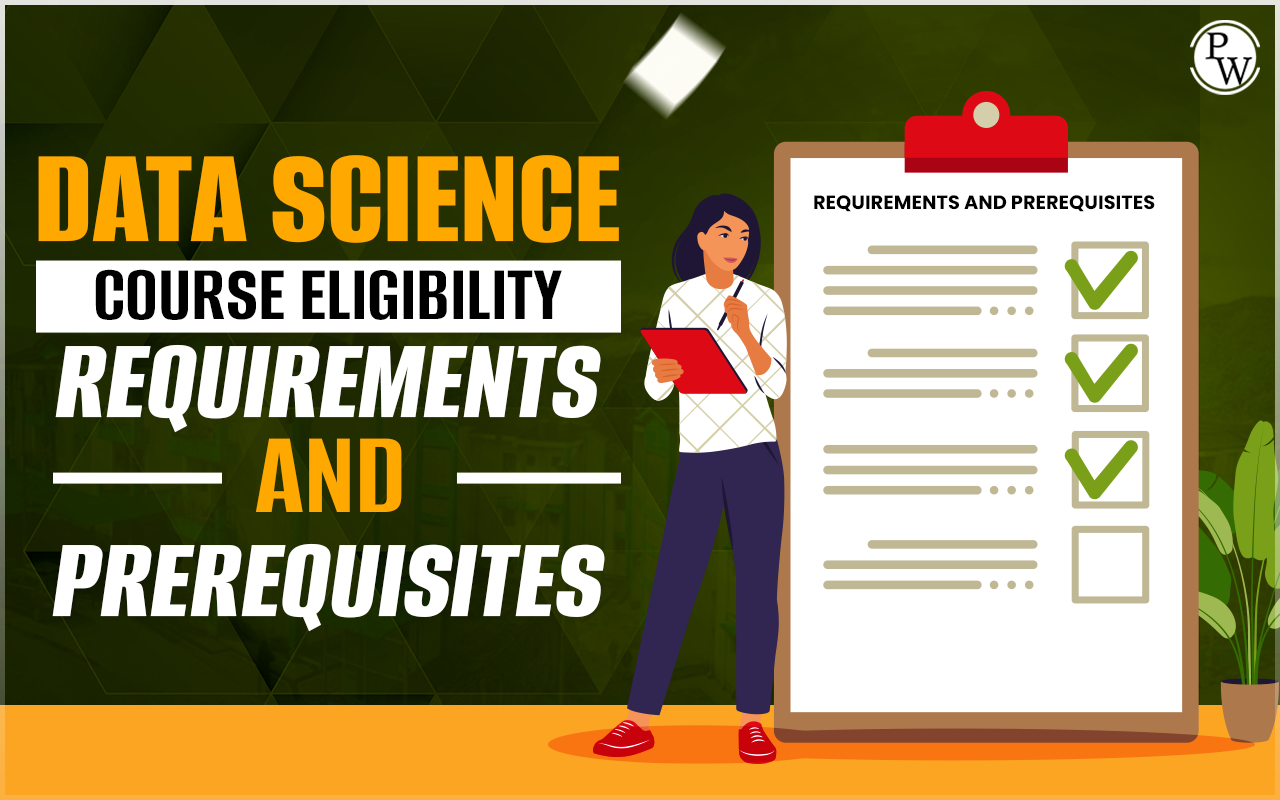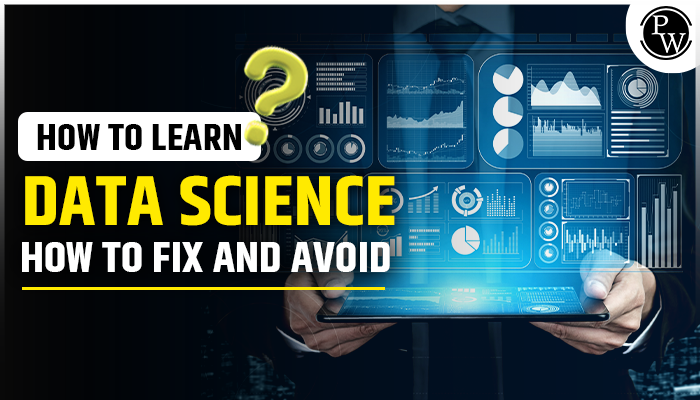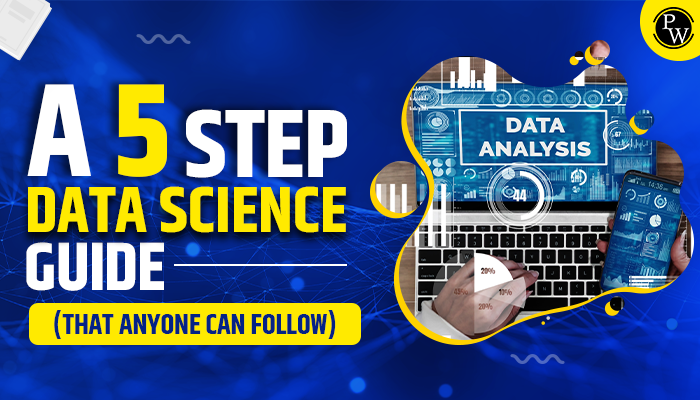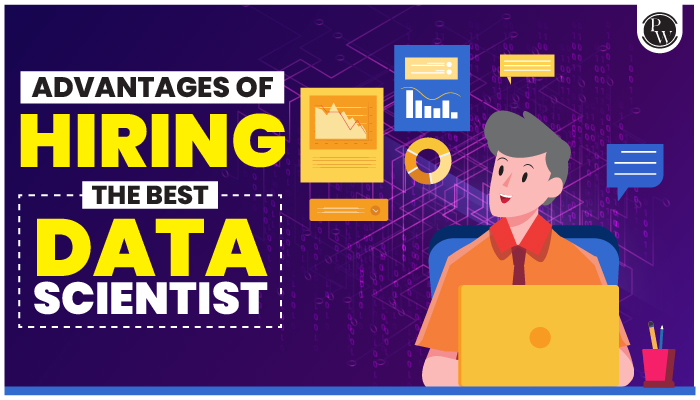Data Science Course Eligibility: In 2023, data has immeasurable value, and data science has emerged as a rapidly growing field with substantial potential. Across the globe, organisations are turning to data-driven decision-making, and data scientists are at the forefront of this transformation. If you are intrigued by data science and contemplating a career in this dynamic field, a Full Stack Data Science course could be just what you need. Additionally, you may be curious about the data science course eligibility and qualifications. In this article, we’ll talk about the prerequisites for embarking on a data science journey, from recognizing the demand for data scientists to the specifics of a data science curriculum.

Data Science Demand
In the era of big data, data science has witnessed remarkable demand, underscoring its significance in today’s job market. In the age of extensive data, data science sees high demand, highlighting its importance in the current job market. Data science isn’t just a trendy term; it’s crucial for companies and groups pursuing a competitive edge. Here’s a brief look at the data science demand:
Current State of Data Science
Data science transcends industry boundaries, boasting a broad spectrum of applications. Sectors such as finance, healthcare, e-commerce, and marketing actively harness data science to dissect data and extract invaluable insights. Furthermore, data science has extended its reach to domains like image recognition, natural language processing, and recommendation systems, making it an exceptionally versatile field.
Job Market Trends and Salary Prospects
The demand for data scientists is evident in the trends of the job market. Job postings for data scientists have exhibited substantial growth in recent years, with this trajectory expected to persist. Additionally, data scientists enjoy lucrative compensation, including competitive salaries and the potential for substantial bonuses, rendering it one of the most appealing career paths in the technology sector.
The Role of Data Scientists
Data scientists hold a pivotal role within organisations, enabling data-informed decision-making. They work with data to detect patterns, construct predictive models, and offer actionable insights. Data scientists bridge the divide between raw data and valuable intelligence, a crucial element for making well-informed business decisions. Their work has a direct impact on an organisation’s prosperity and expansion.
Data Science Course Eligibility
With an appreciation for the demand for data scientists, let’s delve into the prerequisites for data science courses. Data science programs often necessitate specific prerequisites to ensure candidates can handle the demanding coursework and excel in the field.
Educational Background Requirements
Bachelor’s Degrees in Related Fields
Many data science courses mandate a bachelor’s degree, usually in a related field such as computer science, mathematics, statistics, engineering, or economics. These degrees furnish a robust basis in quantitative skills and analytical thinking, which are indispensable in data science.
Alternative Pathways for Non-Technical Backgrounds
Without a technical bachelor’s degree, you can follow specialised pathways. These routes may demand preliminary courses in maths, stats, and coding before tackling data science essentials. Some institutions even offer transition programs to assist non-technical students in entering the field.
Technical Prerequisites
To thrive in data science, you must possess a solid technical underpinning. Here are several of the technical prerequisites:
Programming Languages
- Python: Python serves as the most prevalent programming language in data science. Familiarity with Python is imperative since it is employed for data manipulation, analysis, and the construction of machine learning models.
- R: R stands as another prominent programming language in data science, particularly favoured by statisticians. It is known for its robust statistical and data visualisation libraries.
Mathematics and Statistics
A robust grasp of mathematics and statistics is pivotal in data science. Comfort with concepts such as:
- Linear Algebra: Applied in matrix operations and eigenvalues.
- Calculus: Especially derivatives and integrals.
- Probability and Statistics: Comprehension of probability distributions, hypothesis testing, and regression analysis.
Data Analysis Tools
Familiarity with data analysis tools is indispensable for data scientists. These tools encompass:
- Jupyter Notebook: An interactive environment for coding and documenting data analysis.
- Pandas: A Python library for data manipulation and analysis.
- NumPy: A foundational package for scientific computation using Python.
- Scikit-Learn: A Python library for machine learning.
Data Scientist Qualifications and Skills
Data science is a dynamic and multi-faceted domain that necessitates a distinctive blend of qualifications, technical competencies, and personal attributes. Aspiring data scientists should aim to cultivate a diverse skill set and nurture specific qualities. Here, we delve deeper into the qualifications and skills that can set you on the path to becoming a successful data scientist.
Qualifications
Educational Background
As previously mentioned, data science typically demands a robust educational foundation. Most data science roles favour candidates with at least a bachelor’s degree, and advanced degrees like master’s or Ph.D. can confer an advantage, particularly for research or specialised positions within the field.
Relevant Degrees
While computer science, maths, and stats degrees are common in data science, diversity is welcome. Degrees in engineering, physics, economics, and social sciences contribute by fostering analytical thinking and problem-solving skills.
Continual Learning
Data science is a continually evolving field, making a commitment to lifelong learning crucial. Pursuing certifications and participating in workshops and conferences can help you stay current with emerging technologies and best practices.
Core Skills and Qualities
Analytical Mindset
Data scientists must possess a sharp analytical mindset. This encompasses the ability to break down intricate problems into manageable components and make decisions based on data. Critical thinking and logical reasoning are crucial for interpreting data and drawing meaningful conclusions.
Communication Skills
Effective communication forms the bedrock of the data scientist’s role. You must be capable of conveying your findings to both technical and non-technical stakeholders. The aptitude to elucidate complex concepts in a lucid and understandable manner is indispensable.
Problem-Solving Abilities
At the core, data scientists are problem solvers. They tackle real-world challenges using data, machine learning, and statistical techniques. The capacity to identify problems, formulate hypotheses, and devise innovative solutions is a pivotal attribute.
Domain Knowledge
Comprehending the industry or domain you operate in is pivotal. Data scientists often function in specific sectors like healthcare, finance, or e-commerce. A profound understanding of the intricacies of your domain aids in constructing pertinent models and gleaning meaningful insights.
Teamwork
Data science projects are rarely solitary endeavours. Collaboration with data engineers, domain experts, and other team members is common. Being a team player and adeptly communicating your ideas and findings within a team setting is fundamental.
Technical Skills
Programming Proficiency
Proficiency in programming languages is foundational. Python is the most widely used language in data science for tasks like data manipulation, analysis, and machine learning. R is also favoured for statistical analysis.
Data Manipulation and Analysis
You should be adept at working with data using libraries like Pandas and NumPy in Python. These tools facilitate data manipulation, cleaning, and transformation into a usable format.
Machine Learning
Mastering machine learning algorithms is essential, covering supervised, unsupervised, and deep learning for complex tasks like image recognition and natural language processing.
Data Visualization
The capacity to craft engaging data visualisations is crucial for conveying insights. Tools such as Matplotlib, Seaborn, and Tableau are commonly employed for this purpose.
Database Knowledge
Data scientists frequently interact with databases. Familiarity with SQL for querying relational databases and NoSQL databases like MongoDB can be advantageous.
Big Data Technologies
As data volumes continue to expand, big data technologies like Hadoop and Spark are gaining importance. Familiarity with these tools for data storage, processing, and analysis is advantageous.
Specialised Skills
Data science is an extensive field, and some roles might require specialised skills. These could encompass:
Natural Language Processing (NLP)
For those interested in working with text data, NLP skills, which encompass tasks such as sentiment analysis, text classification, and language translation, are essential.
Computer Vision
For roles involving image or video data, proficiency in computer vision is pivotal. This incorporates tasks like image recognition and object detection.
Time Series Analysis
In the realms of finance or forecasting, understanding time series data and models is critical for predicting future trends.
Business Intelligence
If your focus is on business-oriented data analysis, expertise in data warehousing, data mining, and reporting tools can be beneficial.
Optimization Techniques
Certain roles may necessitate optimization techniques to efficiently resolve intricate problems. These are frequently employed in operations research or logistics.
Tools and Frameworks
In addition to programming languages and data analysis libraries, data scientists should be at ease with an array of tools and frameworks, including:
Jupyter Notebook
An interactive environment for writing code and documenting data analysis, making it a prevalent choice for data scientists.
Scikit-Learn
A potent machine learning library in Python featuring a broad range of algorithms and tools.
TensorFlow and PyTorch
Prominent deep learning frameworks used for building and training neural networks.
Data Visualization Tools
Tools such as Matplotlib, Seaborn, Tableau, and D3.js are commonly utilised to generate informative and visually appealing visualisations.
Database Tools
Data scientists often work with databases, necessitating familiarity with SQL for data storage and retrieval, in addition to tools for data integration.
Data Science Curriculum
Data science courses vary in terms of their curriculum, but they generally encompass common themes and subjects that you can anticipate. Here’s an overview of what you might encounter in a typical data science program:
Core Topics Covered in a Data Science Program
Statistics and Probability
Statistics and probability form the foundation of data science. You’ll study concepts like probability distributions, hypothesis testing, and regression analysis.
Data Preprocessing and Cleaning
In real-world scenarios, data can be untidy. Data preprocessing entails the cleaning, transformation, and organisation of data to render it suitable for analysis. This process is often more time-consuming than the actual analysis but is pivotal for accurate results.
Machine Learning Algorithms
Machine learning is central to data science. You’ll explore various algorithms for supervised and unsupervised learning, along with deep learning methods for neural networks.
Data Visualisation and Storytelling
Data visualisation is about presenting data clearly. You’ll acquire skills in using tools like Matplotlib, Seaborn, and Tableau for creating informative visualisations.
Elective Courses and Specialisation Options
Data science programs often present elective courses that enable you to specialise in a specific area of interest. Some prevalent specialisations encompass:
- Natural Language Processing: This specialisation centres on the interaction between computers and human language, encompassing tasks such as sentiment analysis and text generation.
- Deep Learning: Deep learning is a subset of machine learning that focuses on neural networks, particularly relevant in image and speech recognition.
- Business Intelligence: This specialisation underscores the use of data for strategic business decisions, covering data warehousing, data mining, and reporting tools.
Hands-on Projects and Practical Experience
Data science is a hands-on field, and you will likely be required to complete practical projects. These projects facilitate the application of your knowledge to real-world scenarios and permit the development of a portfolio that showcases your abilities to potential employers.
The Science Behind Data
Success in this field hinges on grasping the foundational principles and theories of data science, which blends mathematics, statistics, computer science, and domain expertise. Here are critical aspects to keep in mind:
Multidisciplinary Nature of Data Science
Data science transcends disciplinary boundaries. It draws from mathematics, statistics, computer science, and domain-specific knowledge. This multidisciplinary approach is indispensable for addressing complex, real-world problems.
Real-World Applications and Case Studies
To attain a deeper comprehension of data science, it is beneficial to explore real-world applications and case studies. Learning from practical instances helps you appreciate how data science is employed to resolve a wide range of challenges across diverse industries.
Data Science Syllabus
To provide a clearer picture of what you might encounter in a data science course, let’s examine a sample course structure and modules:
Introduction to Data Science
- Overview of Data Science: An introduction to the field of data science, its history, and its role in solving real-world problems.
- The Data Science Process: Understanding the data science workflow, from data collection to model deployment.
- Tools of the Trade: Introduction to Python and data analysis libraries (e.g., NumPy, Pandas) for data manipulation and exploration.
- Data Collection and Cleaning: Techniques for acquiring and cleaning raw data to make it suitable for analysis.
Data Analysis and Visualization
- Exploratory Data Analysis (EDA): Learning how to explore and summarise data using statistical methods and visualisations.
- Descriptive Statistics: Understanding measures of central tendency, variability, and distributions.
- Data Visualization: Using libraries like Matplotlib and Seaborn to create meaningful visual representations of data.
- Correlation and Regression: Exploring relationships between variables and conducting regression analysis.
Machine Learning Fundamentals
- Introduction to Machine Learning: Understanding the fundamentals of machine learning, supervised vs. unsupervised learning, and common use cases.
- Linear Regression: Learning to build predictive models for continuous variables.
- Classification Algorithms: Exploring algorithms like Logistic Regression, Decision Trees, and Random Forests for classifying data.
- Model Evaluation: Assessing model performance through metrics like accuracy, precision, recall, and F1-score.
Advanced Machine Learning
- Support Vector Machines (SVM): Understanding the principles of SVM for both classification and regression tasks.
- Clustering: Exploring unsupervised learning methods such as K-Means clustering and hierarchical clustering.
- Dimensionality Reduction: Techniques like Principal Component Analysis (PCA) to reduce the dimensionality of data.
- Ensemble Learning: Introduction to ensemble methods like bagging and boosting.
Deep Learning and Neural Networks
- Introduction to Deep Learning: Understanding the basics of neural networks and their applications.
- Feedforward Neural Networks: Building and training neural networks for tasks like image and text classification.
- Convolutional Neural Networks (CNN): Delving into CNNs for image analysis and computer vision.
- Recurrent Neural Networks (RNN): Exploring RNNs for sequential data analysis and natural language processing.
Data Science Tools and Libraries
- Data Preprocessing: Techniques for data cleaning, feature engineering, and handling missing values.
- Scikit-Learn: In-depth exploration of the Scikit-Learn library for machine learning model development and evaluation.
- TensorFlow and Keras: Introduction to popular deep learning frameworks for neural network implementation.
- Big Data Technologies: Understanding tools like Hadoop and Spark for handling large datasets.
Data Science Capstone Project
- Real-World Project: Working on a comprehensive data science project that involves data collection, cleaning, analysis, model development, and visualisation.
- Problem Statement: Defining a clear problem statement that requires data-driven solutions.
- Presentation and Documentation: Communicating project findings through effective visualisation and documentation.
- Peer Review: Sharing and evaluating projects with peers to receive constructive feedback.
Tips for Selecting the Right Data Science Course
Selecting the right data science course is pivotal for your success in the field. Here are some tips to consider when making your decision:
Program Accreditation
Check if the program is accredited by a reputable organisation or institution.
Curriculum and Specialisations
Ensure the curriculum aligns with your career goals and offers the specialisations you’re interested in.
Hands-On Projects
Look for programs that offer practical projects to apply your knowledge.
Instructors and Industry Connections
Research the faculty’s credentials and industry connections to ensure you receive quality education.
Flexibility
Consider factors like program duration, part-time options, and online or on-campus availability to choose a program that fits your lifestyle.
Final Thoughts
Data science is a domain of immense potential, and the demand for data scientists is on the rise. To embark on a successful career in data science, it is imperative to comprehend the prerequisites and qualifications. Aspiring data scientists should concentrate on establishing a strong foundation in mathematics, statistics, programming, and data analysis tools. Moreover, nurturing essential skills such as problem-solving, communication, and domain knowledge is crucial for success in this multidisciplinary field.
Selecting the right data science course is a critical step in your journey. With the right education and hands-on experience, you can become a proficient data scientist and contribute to the data-driven decision-making processes that shape our world.
Want to learn how to make sense of big data? PhysicsWallah’s Full Stack Data Science Pro Course can teach you how. Our course covers all aspects of data science that data scientists need. So, enrol now and start your journey to becoming a sought-after data scientist!
Data Science Course Eligibility FAQs
Is there a demand for data scientists in today's job market?
Yes, data scientists are highly sought after due to the growing reliance on data-driven decision-making in various industries.
Must I have a technical background for a data science course?
While beneficial, many data science programs offer routes for non-technical backgrounds. To start, you might need prerequisite courses in maths, stats, and programming.
What are the key technical requirements for data science?
Necessary technical skills include proficiency in Python and R programming, a solid foundation in maths and stats, and familiarity with data analysis tools like Jupyter Notebook, Pandas, and NumPy.
What skills are essential to excel as a data scientist?
Critical skills include analytical thinking for pattern recognition, effective communication to convey insights, and strong problem-solving abilities. Specialised skills like machine learning and data visualisation are highly valued.
What's in a typical data science course curriculum?
A typical curriculum covers data analysis, machine learning, data visualisation, and deep learning. It often includes hands-on projects to apply knowledge and build a portfolio for a data science career.




